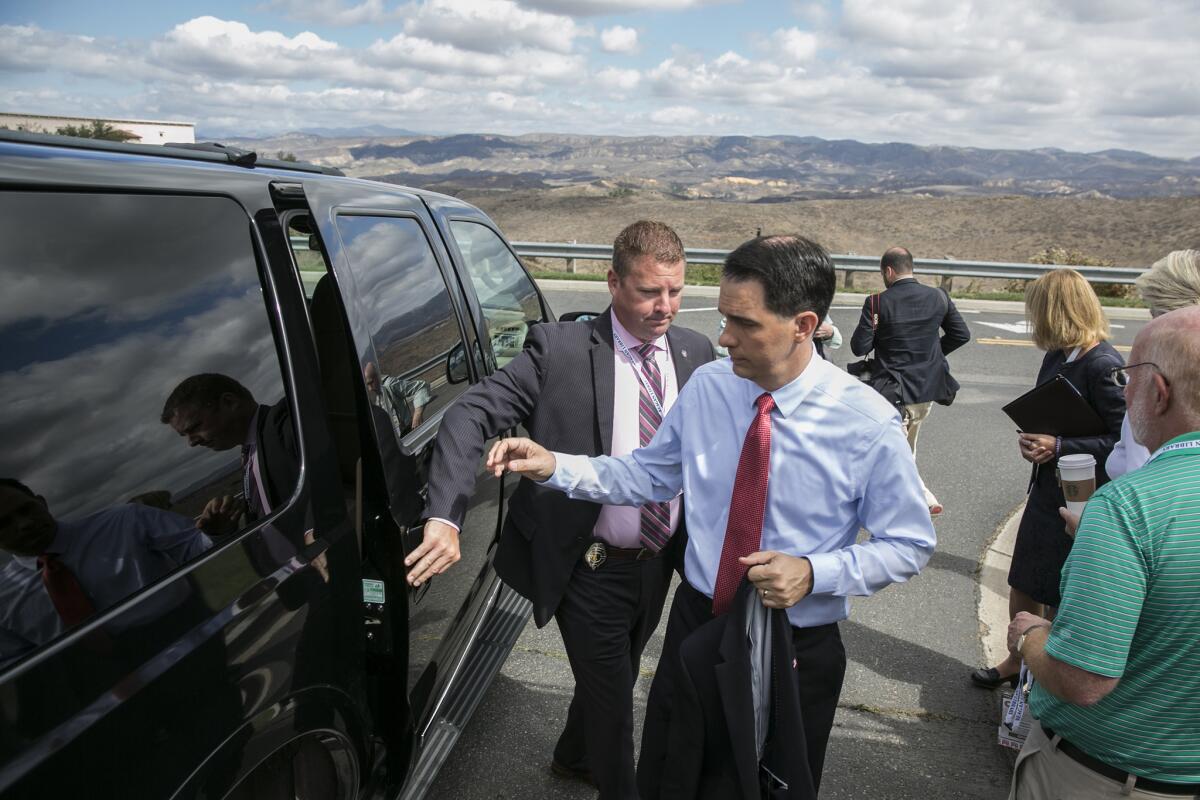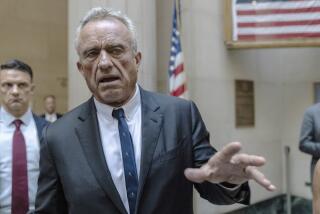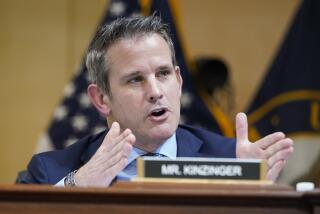Scott Walker ends campaign for president -- the second Republican to drop out

Wisconsin Gov. Scott Walker in California last week.
- Share via
Reporting from Washington — Wisconsin Gov. Scott Walker, who as recently as midsummer was seen as one of the leading candidates for the Republican nomination for president, quit the race Monday, calling on other GOP hopefuls to exit the contest as well to allow a head-on challenge to front-runner Donald Trump.
“I believe that I am being called to lead by helping to clear the field,” Walker said to reporters in Madison, the state capital. “I encourage other Republican presidential candidates to consider doing the same so that the voters can focus on a limited number of candidates who can offer a positive, conservative alternative to the current front-runner.”
The GOP campaign has “drifted into personal attacks,” he said, without ever naming Trump. Changing that is “fundamentally important to the future of the party and, more importantly, to the future of the country.”
Walker’s statement – and his remarkably rapid plunge in the polls – vividly illustrated how Trump has upended the GOP contest.
Walker is the second high-profile dropout this month in a campaign reshaped by voter demand for candidates outside the ranks of traditional politicians. His departure follows that of former Texas Gov. Rick Perry, who had also warned that Trump was damaging GOP chances of winning the presidential race.
Both men quit after rapidly fading support in polls led to dwindling campaign donations. In recent days, Walker began canceling events as aides held urgent talks with fundraising firms in an effort to raise cash, according to people familiar with the discussions.
Although the super-PAC allied with Walker had raised millions of dollars, those funds could not be used to pay his staff or campaign expenses in key primary states.
Walker’s decline was remarkably steep -- he was in second place in some polls early this summer, but lost nearly all his support in recent weeks. A CNN/ORC poll released Sunday had him at zero.
“This is one of the more spectacular collapses of a campaign over a two-and-a-half-month period in polling history,” said Charles Franklin, director of Wisconsin’s best-known statewide poll, who has followed Walker’s career closely.
The collapse was particularly surprising because it happened without either a scandal or sustained attacks from his rivals, Franklin noted. Instead, Walker damaged himself, initially by stumbling on key questions – taking multiple positions on immigration issues, for example – and then by appearing the epitome of a scripted, traditional politician in an election where voters seem to put a premium on spontaneity and authenticity.
“Walker is caught up in a year of the anti-politician, the non-politician,” Franklin said.
TRAIL GUIDE: All the latest news on the 2016 presidential campaign >>
When Walker began preparing for the race last year, he expected to campaign on the theme that he was a conservative who had proved he could “fight and win” as an elected official.
He had risen to stardom in Republican ranks shortly after he was elected governor in 2010, when he successfully pushed to repeal most collective bargaining rights for government workers. He then defeated a labor-sponsored recall campaign, building a national following among conservative activists.
In Iowa, where the campaign’s first nominating contest takes place, he quickly took the lead in polls, with strong support from evangelical voters as well as fiscal conservatives.
Iowa voters “liked him because here’s a true conservative who stood firmly on principle, took all the slings and arrows and was still standing to talk about it,” said Craig Robinson, a prominent conservative activist and former Iowa GOP official. “They thought he was vetted and he had all the makings of a good national candidate.”
But Walker’s campaign suffered several initial stumbles, raising doubts about whether he was ready for the national spotlight. Then Trump’s entry into the race sent Walker’s hopes into rapid decline.
Trump galvanized an anti-establishment mood among a large swath of Republican voters that appears to have tarred all candidates who have held elected office. More than half of GOP voters in recent polls have said their preferred candidate is someone outside of traditional politics.
“In January, Walker was viewed as being the alternative to Jeb Bush. Well, that’s not a priority of conservatives anymore,” Robinson said. “They’re not out there looking for an alternative to Bush. They’re probably out there looking for an alternative to Trump. Walker doesn’t fit the bill.”
SIGN UP for the free Essential Politics newsletter >>
The immigration issues that Trump pushed to the forefront of the campaign only made Walker’s problems worse. For a time, he seemed to be trying to outbid Trump in seeking the support of Republicans who want to limit immigration – arguing for restricting legal as well as illegal entry to the U.S.
But Walker reversed field several times, taking conflicting positions, for example, on the question of whether children born in the U.S. to mothers in the country illegally should be denied citizenship.
A comment that seemed to suggest that he favored building a wall along the U.S. border with Canada drew ridicule. Prominent donors talked openly about concerns that Walker had moved too far to the right in trying to outflank Trump.
“I feel badly for him,” Trump said Monday on Fox News.
In both of the campaign’s two debates so far, Walker faded. In the most recent debate at the Reagan Library in Simi Valley, he spoke less than any of the other 10 candidates.
Walker’s abrupt departure set off a scramble by other candidates to win backing of his major donors and key operatives. Already, one major donor, Stanley Hubbard, a billionaire from Minnesota who built a fortune owning TV and radio stations, had begun giving money to Carly Fiorina.
For the moment, at least, none of the other candidates seemed ready to take up Walker’s suggestion that they join him in dropping out.
“I don’t think that’s realistically going to happen,” said Rick Tyler, a spokesman for Sen. Ted Cruz of Texas.
Other campaigns limited themselves to routine statements of praise for a defeated rival.
“It is surprising,” said Danny Diaz, campaign manager for Bush, the former Florida governor. “These campaigns are tough. Scott Walker’s a good guy.”
Walker’s adversaries in the union movement, however, lost no time in thumbing their noses at him as he exited the race. When Walker declared his candidacy, the AFL-CIO had labeled him a “national disgrace.”
Monday afternoon, as word spread that he was quitting, the labor federation had this to say: “Scott Walker is still a disgrace, just no longer national.”
Lauter reported from Washington and Mehta from Los Angeles. Staff writers Noah Bierman and Lisa Mascaro in Washington and Michael Finnegan in Los Angeles contributed to this report.
For more campaign coverage, follow @davidlauter and @LATSeema
MORE 2016 CAMPAIGN NEWS:
#AskTrump: Would he forgo a presidential salary?
California Republican voters’ support for Bush and Trump wavers after debate
Fiorina seizes the moment after poll shows her in second place in GOP race
More to Read
Get the L.A. Times Politics newsletter
Deeply reported insights into legislation, politics and policy from Sacramento, Washington and beyond. In your inbox twice per week.
You may occasionally receive promotional content from the Los Angeles Times.












